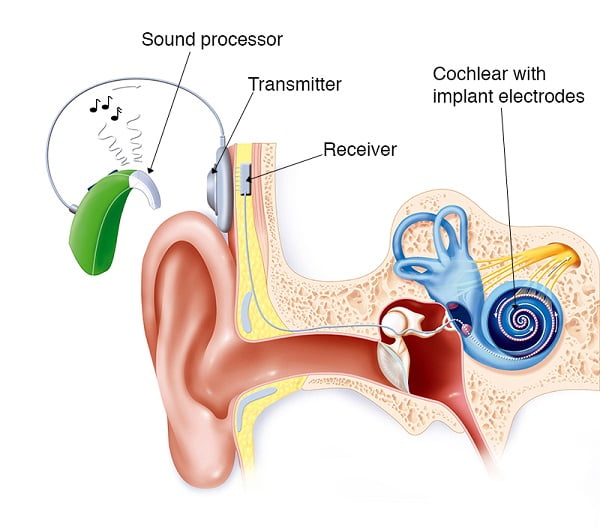A cochlear implant will be considered when conventional hearing aids do not benefit the user. An individual who experiences the following might be a good candidacy for cochlear implantation:
- Severe to profound sensorineural hearing loss
- Speech perception and understanding do not improve with hearing aids
- Reliance on lip-reading even with hearing aids on.
Before considering if a cochlear implant is suitable for an individual, we must understand how a hearing aid differs from a cochlear implant in improving a person’s hearing ability. A hearing aid is a device that captures, amplifies, and transmits sound through our hearing pathway. In other words, hearing aids transfer sound acoustically from the outer ear to the inner ear.
However, for a cochlear implant, there is an implant that needs to be surgically placed inside the ear. The sound collected from the external device will be transferred to the internal device and converted into electrical signals to stimulate the nerve directly. The sound will bypass the outer and middle ears; it will be electrically transmitted into the inner ear to be perceived as sound.

How effective a cochlear implant is varies from person to person. Everyone performs differently after the implantation, and it largely depends on the rehabilitation and therapy sessions after the surgery.
Those who decide to undergo cochlear implantation will need to understand that a cochlear implant does not restore hearing to normal but helps in speech understanding with the help of a series of rehabilitation. To experience the improvement in communication, a person has to attend a series of training and therapy to retrain the sense of hearing after the surgery because the perception of sound will be different from before.
Even though cochlear implantation can help those not benefiting from hearing aids, it is not always the right option for everyone. It would be best if you went through a series of assessments, such as an MRI and X-ray, to determine the ear condition and talk to your ENT specialist before proceeding with surgery.
If you are considering this option, but not sure if it fits your condition, please book an online consultation or a physical consultation with us. Our hearing care specialists will check your hearing condition and will help you find out the best way to manage it.